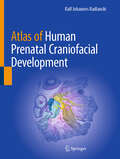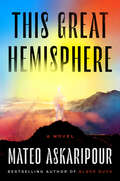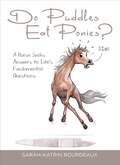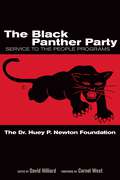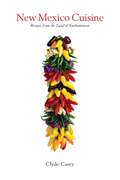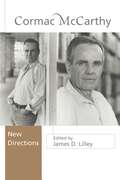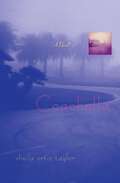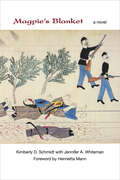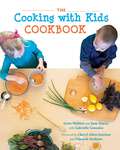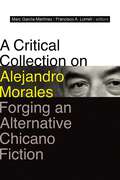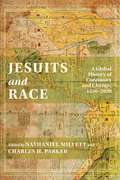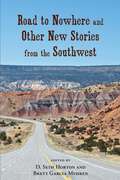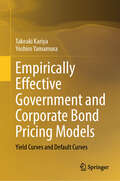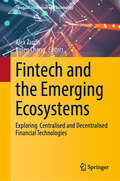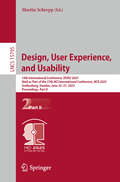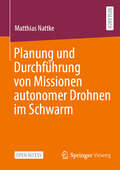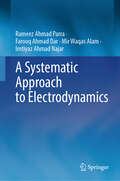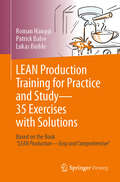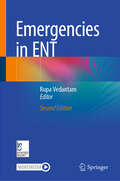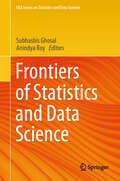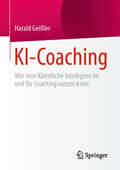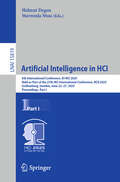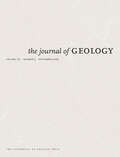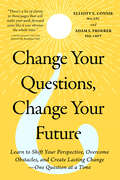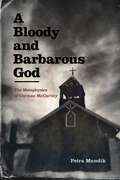- Table View
- List View
Atlas of Human Prenatal Craniofacial Development
by Ralf Johannes RadlanskiThis comprehensive atlas captures the prenatal formation of the human head with precision and detail, helping the reader discover the intricate world of craniofacial development. It serves as both a rich visual reference and a foundation for further research on how molecular signaling shapes the unique features of the craniofacial structure. Authored by a leading researcher with more than four decades in prenatal morphogenesis, this atlas goes beyond existing texts by offering an in-depth look at embryonic head formation through high-quality histology and advanced 3D reconstructions. More than 400 meticulously curated, vivid color images include detailed illustrations and 3D models that trace each crucial stage in the development of the human head's anatomical structures. An invaluable resource for scientists, medical professionals, educators, and anyone studying human development, the Atlas of Human Prenatal Craniofacial Development provides insights that lay the groundwork for understanding not only human morphology but also the roots of congenital anomalies.
This Great Hemisphere: A Novel
by Mateo Askaripour&“A thrilling page-turner.&”—Brit Bennett, #1 New York Times bestselling author &“Wildly imaginative.&”—The Washington Post&“Askaripour soars.&”—The Boston GlobeA rallying cry for anyone who has ever felt invisible. A powerful, captivating novel about how far we&’ll go to protect the ones we love, and what happens when we resist the narratives others write about us. Welcome to the Northwestern Hemisphere, 2529. An equally exciting and terrifying world born from the ashes of our own, where almost half of people are born invisible, and thus relegated to second-class citizenship. Sweetmint, a young invisible woman, has done everything right her entire life, from excelling in school to landing a highly sought-after apprenticeship with a mysterious, powerful inventor. But all she has fought so hard to earn comes crashing down when she learns that her missing brother, whom she had presumed dead, is not only alive and well but also the primary suspect of a high-profile political murder. Armed with nothing more than courage, intellect, and unwavering love for her brother, Sweetmint sets off on the mission of a lifetime: to find her brother before it&’s too late. With five days until the hemisphere&’s big election, Sweetmint must evade and outsmart all who aim to destroy her and her people, braving a world full of hard truths that many would rather remain hidden.
Do Puddles Eat Ponies?
by Sarah-Katrin BourdeauxA humorous look at the world through the eyes of a horse, peppered with satirical observations about the equestrian world.Sharif, an easily spooked Arabian, is trying to find his life&’s calling, but between the truly terrifying dangers of everyday life and the strange hoofless beings that wave their tiny tentacles at his nose, it is proving a challenge! Barely do his newborn hooves touch the ground for the first time and already he&’s in mortal danger—and the hoofless beings really aren&’t helping anything. The world is full of monsters and mysteries as far as the eye can see!As he ventures out beyond the paddock he shared with his mom, Sharif gets dragged into all manner of dark worlds and questionable jobs, and is constantly surrounded by unusual characters he&’s not sure he can trust, including The Chicken, The Fat Boss, and Dumb-as-Rocks. But even when the threats behind every bush grow more menacing, he doesn&’t lose sight of his ultimate goal: to be the most famous and beautiful show horse under the sun.Then, just before his greatest triumph, the hoofless betray Sharif to cold-blooded criminals, and everything—evenreally, this time, his life—seems to be at stake. Can one little Arabian horse stretch his courage and reach his dream?This hilarious, unusual, superbly imagined illustrated novel for &“grownups who like horses&” is destined to be a hit with anyone who enjoys a little bit of ridiculous and a slightly cynical take on the subcultures that bind us.
The Black Panther Party: Service to the People Programs
by David HilliardThe Black Panther Party represents Black Panther Party members' coordinated responses over the last four decades to the failure of city, state, and federal bureaucrats to address the basic needs of their respective communities. The Party pioneered free social service programs that are now in the mainstream of American life. The Party's Sickle Cell Anemia Research Foundation, operated with Oakland's Children's Hospital, was among the nation's first such testing programs. Its Free Breakfast Program served as a model for national programs. Other initiatives included free clinics, grocery giveaways, school and education programs, senior programs, and legal aid programs. Published here for the first time in book form, The Black Panther Party makes the case that the programs' methods are viable models for addressing the persistent, basic social injustices and economic problems of today's American cities and suburbs.
New Mexico Cuisine: Recipes from the Land of Enchantment
by Clyde W. CaseyWinner of the 2010 New Mexico Book Award for Best CookbookSince he first traveled to New Mexico in the 1960s, Clyde Casey has been in love with New Mexican cuisine and has explored its evolution from Puebloan roots, to influences brought by the Spanish in the early 1500s, to what is today a unique blend of Native American, Spanish, French, cowboy chuck wagon, Mexican, and Mediterranean influences. A companion to Casey&’s Red or Green cookbook, New Mexico Cuisine reflects the diversity of these culinary origins, offering a wide range of New Mexican recipes. Casey includes dozens of quick recipes designed for the convenience of the modern cook as well as traditional recipes that require more time and patience for those looking for a bit of challenge. Along with the recipes, Casey includes engaging notes on one of the most unique histories and cultures in the United States.
Cormac McCarthy: New Directions
by James D. LilleyEven before Harold Bloom designated Blood Meridian as the Great American Novel, Cormac McCarthy had attracted unprecedented attention as a novelist who is both serious and successful, a rare combination in recent American fiction. Critics have been quick to address McCarthy&’s indebtedness to southern literature, Christianity, and existential thought, but the essays in this collection are among the first to tackle such issues as gender and race in McCarthy&’s work. The rich complexity of the novels leaves room for a wide variety of interpretation. Some of the contributors see racist attitudes in McCarthy&’s views of Mexico, whereas others praise his depiction of U.S.-Mexican border culture and contact. Several of the essays approach McCarthy&’s work from the perspective of ecocriticism, focusing on his representations of the natural world and the relationships that his characters forge with their geographical environments. And by exploring the author&’s use of and attitudes toward language, some of the contributors examine McCarthy&’s complex and innovative storytelling techniques.
Coachella
by Sheila Ortiz TaylorIt's 1983 in Coachella Valley and Yolanda Ramírez, a lowly phlebotomist at the Palm Springs hospital, has a hunch. Gay men, hemophiliacs, and women scarred by cosmetic surgery are dying. Safe blood, like the water keeping this desert green, is a lie.In the nearby trailer, Isabel Ochoa Dreyfus disappears into a new identity: Marina Lomas. Somewhere in Iowa her businessman husband sits in the dark, staring at his drink, promising never to hit her again, if only he can track her down.Despite herself, Marina finds companionship at Mac and Gil's annual Casa Diva fashion show. As glamorous men stride up and down a poolside runway, Yo awakens Marina's sleeping desire. Elsewhere in Coachella, Yo's father Crescencio, a gardener, soothes Eliana Townsend, his secret love, by coaxing life from the earth outside her window. She is dying, most likely from AIDS, but no one will tell her the truth. And through it all Crescencio's sister, Tía Josie, keeps the family steady with wisdom from the Rockford Files and her dead Cahuilla husband. Truths surge to the surface in this community of false fronts and deep roots as readers are whisked toward the deafening conclusion of Coachella, the latest from one of Chicano literature's finest writers.
Magpie's Blanket: A Novel
by Kimberly D. SchmidtIn this thoughtful novel Kimberly D. Schmidt brings to life the history of Plains Indian women and the white invasion—an account not solely of violence and bloodshed but also of healing and forgiveness. Magpie&’s Blanket begins with the story of a young Southern Cheyenne woman who survived the horrific Sand Creek Massacre in 1864 only to witness a second attack on her people at the Washita Massacre in 1868. Through the memories of three generations of Cheyenne people, the novel recounts the events of the massacres and the century-late reconciliation after the townspeople&’s misguided attempt to re-create the &“battle&” of the Washita with descendants of US soldiers.
The Cooking with Kids Cookbook
by Jane Stacey Lynn WaltersFor over twenty years the nonprofit organization Cooking with Kids has educated thousands of children to make healthy eating choices through hands-on learning with fresh, affordable foods from diverse cultures. Written for families to use together, this cookbook includes Cooking with Kids&’ most enthusiastically kid-tested dishes, along with tips for engaging children in the kitchen and in the garden. Kids can even pick up a pencil or a crayon and do fun and educational activities right inside the book. Featuring more than sixty-five recipes—among them South American Llapingachos, Minestrone, and Coconut Rice Balls—the authors dish up tasty, nutritious meals and snacks that teach children how to help plan, prepare, and cook meals. This book will show parents and caregivers that kids will enjoy a broad array of foods when they chop, measure, mix, and—of course—eat with pleasure.
A Critical Collection on Alejandro Morales: Forging an Alternative Chicano Fiction
by Francisco A. Lomelí Marc García-MartínezSilver Medalist at the 24th International Latino Book AwardsAlejandro Morales is a pioneer of Chicana and Chicano literature and the author of groundbreaking works including The Brick People, The Rag Doll Plagues, and River of Angels. His work, often experimental, was one of the first to depict harsh urban realities in the barrios—a break from much of the Chicana and Chicano fiction that had been published previously. Morales&’ relentless work has grown over the decades into a veritable menagerie of cultural testimonies, fantastic counterhistories, magical realism, challenging metanarratives, and flesh-and-blood aesthetic innovation. The fourteen essays included in this compendium examine Morales&’ novels and short stories. The editors also include a critical introduction; an interview between Morales, the editors, and fellow author Daniel Olivas; and a new comprehensive bibliography of Morales&’ writings and works about him—books, articles, book reviews, online resources, and dissertations. A Critical Collection on Alejandro Morales: Forging an Alternative Chicano Fiction is a must-read for understanding and appreciating Morales&’ work in particular and Chicana and Chicano literature in general.
Jesuits and Race: A Global History of Continuity and Change, 1530-2020
by Nathaniel Millett; Charles H. ParkerJesuits and Race examines the role that the Society of Jesus played in shaping Western understandings about race and explores the impact the Order had on the lives and societies of non-European peoples throughout history. Jesuits provide an unusual, if not unique, lens through which to view the topic of race given the global nature of the Society of Jesus and the priests&’ interest in humanity, salvation, conversion, science, and nature.Jesuits&’ global presence in missions, imperial expansion, and education lends insight into the differences in patterns of estrangement and assimilation, as well as enfranchisement and coercion, with people from Africa, Asia, and the Americas. The essays in this collection bring together case studies from around the world as a first step toward a comparative analysis of Jesuit engagement with racialized difference. The authors hone in on labor practices, social structures, and religious agendas at salient moments during the long span of Jesuit history in this fascinating volume.
Road to Nowhere and Other New Stories from the Southwest
by Edited by D. Seth Horton and Brett Garcia MyhrenThe Southwest of the twenty-first century is full of surprises, and so is this collection of southwestern short stories published between 2007 and 2011. The writers represented here remind us that this is not the &“Old Southwest&” of gunfighters and sagebrush but, instead, a place of rock collectors, palm readers, and Russian mail-order brides. Well-known authors like Sallie Bingham, Ron Carlson, Laura Furman, and Dagoberto Gilb are joined here by exciting newcomers Eddie Chuculate, Don Waters, Claire Vaye Watkins, and others.
Empirically Effective Government and Corporate Bond Pricing Models: Yield Curves and Default Curves
by Takeaki Kariya Yoshiro YamamuraThis book presents a comprehensive, innovative, integrated, and empirically effective system for cross-sectionally analyzing prices of government bonds (GBs) and corporate bonds (CBs) to timely obtain practically useful information on yield curves and default curves. The system consists of (1) GB-pricing model that values coupon GB and gives yield curve, (2) credit risk rating model of each CB, and (3) CB-pricing model that gives default curve or equivalently term structure of default probabilities (TSDP), which prices credit default swap (CDS). And in view of data science, the empirical effectiveness of the modeling concept, formulated models with price correlations, and estimation procedures in the system is verified with monthly data through various applications of the models to practically important analyses on prices of Japanese GBs and CBs, the USA GBs and CBs, and European GBs (EUGBs) where GBs of Germany, France, Italy, Spain, and Greece. Fact, both yield curves and default curves over a future time horizon. The system enables us to get practically and timely predictive information for making decisions in investment, formation of effective bond portfolio, asset and liability management (ALM), and risk management of yield curve and default curve in banks, trust funds, pension funds, life insurance firms, among others.
Fintech and the Emerging Ecosystems: Exploring Centralised and Decentralised Financial Technologies (Financial Innovation and Technology)
by Alex Zarifis Xusen ChengFinancial technologies, commonly referred to as Fintech, are revolutionizing and reorganizing the financial sector. This digital transformation profoundly impacts society and influences our everyday lives in numerous ways, as financial services intersect with various other services we utilize. This book offers contributions from leading researchers in the field, providing a comprehensive understanding of this multifaceted transformation. It encompasses emerging financial technologies such as cryptoassets, including Bitcoin and Non-Fungible Tokens (NFTs), Decentralized Finance (DeFi), Central Bank Digital Currencies (CBDCs), and the growing significance of Artificial Intelligence (AI) and Generative AI. While the primary audience comprises researchers and academics, practitioners and students can also glean practical insights from its contents. Chapters "A Model of Trust in Central Bank Digital Currency (CBDC) in Brazil: How Trust in a Two-Tier CBDC with Both the Central and Retail Banks Involved Changes Consumer Trust" and "Building Trust in AI: Leadership Insights from Malaysian Fintech Boards" are available open access under a Creative Commons Attribution 4.0 International License via link.springer.com.
Design, User Experience, and Usability: 14th International Conference, DUXU 2025, Held as Part of the 27th HCI International Conference, HCII 2025, Gothenburg, Sweden, June 22–27, 2025, Proceedings, Part II (Lecture Notes in Computer Science #15795)
by Martin SchreppThis six-volume set LNCS 15794-15799 constitutes the refereed proceedings of the 14th International Conference on Design, User Experience, and Usability, DUXU 2025, held as part of the 27th International Conference on Human-Computer Interaction, HCII 2025, in Gothenburg, Sweden, during June 22-27, 2025. The total of 1430 papers and 355 posters included in the HCII 2025 proceedings was carefully reviewed and selected from 7972 submissions.The six volumes cover the following topics:Part I: Information design and visualization; emotional interaction and persuasive design; and interactive systems and user behavior.Part II: UX design and evaluation methodologies; inclusive design and accessible experiences; and product and industrial design.Part III: Design and the digital transmission of culture; design for arts and creativity; and designing for health and therapeutic experiences.Part IV: Consumer experience and service design; design and evaluation of technology-enhanced learning; and UX in automotive and transportation.Part V: Design education and professional practice; and human-centered design and interactive experiences.Part VI: AI and the future of UX design; and UX in AI and emerging technologies.
Planung und Durchführung von Missionen autonomer Drohnen im Schwarm
by Matthias NattkeDieses Open-Access-Buch behandelt die Missionsplanung autonomer Drohnenschwärme als verteiltes System. Sie wird als vielseitiges Werkzeug verstanden, das beschreibende, gestaltende und anwendungsorientierte Aspekte umfasst. Die Weiterentwicklung des UAV-Sektors erfordert interdisziplinäre Ansätze, um Herausforderungen zu bewältigen und neue Anwendungsfelder zu erschließen. Ein umfassendes Verständnis von UAV-Systemen ist essenziell, um deren Entwicklung und Einsatz effizient zu gestalten. Technische Systemaspekte, konzeptionelle Flugplanungen sowie sicherheitsrelevante Interaktionen während der Mission werden berücksichtigt. Ein Fokus liegt auf der Analyse der Interaktion zwischen Maschine und Fernpilot. Diese Erkenntnisse fließen in die Entwicklung einer Prozessarchitektur ein, die Konzepte und Vorschläge bietet. Iterative Prozesse optimieren das kooperative Fliegen und die Flugstabilität der Drohnen. Das Ergebnis ist ein fliegendes Sensornetzwerk mit vielseitigen Anwendungen.
A Systematic Approach to Electrodynamics
by Mir Waqas Alam Rameez Ahmad Parra Farooq Ahmad Dar Imtiyaz Ahmad NajarThis book explains the principles and applications of classical electrodynamics through a meticulously crafted text designed to demystify complex theories. It adopts a structured approach that guides readers from fundamental mathematical tools to more intricate concepts. The content provides a thorough examination of the Laplace Equation in various coordinate systems, exploring its symmetries and delving into advanced problem-solving techniques such as the method of images and finite element analysis. Practical applications are emphasized, with detailed discussions on electrostatics involving point charges and conducting spheres, and dynamic scenarios like conducting spheres in uniform electric fields. The book also ventures into advanced topics including the covariant formulation of electrodynamics, examining Lorentz transformations and field transformations with clarity. With its balanced narrative that combines theoretical depth with accessible language, the book caters to a diverse readership, making it an ideal resource for those seeking comprehensive knowledge in this challenging field.
LEAN Production Training for Practice and Study - 35 Exercises with Solutions: Based on the Book “LEAN Production - Easy and Comprehensive"
by Roman Hänggi Lukas Budde Patrick BalveNo production is perfect. Waste creeps into every process. It makes it slow and expensive. Goods lie around in the warehouse, production takes place in unnecessarily large batches or employees wait unproductively to produce the next part. The result is high production costs and disappointed customers. Lean Production tackles this waste in all processes. But how do you actually implement the various Lean principles and methods? The success of Lean Production lies in doing, and this is precisely where the book comes in. The 35 practical exercises show in detail how the Lean approaches can be applied and successfully implemented. The solutions are supplemented with practical tips for implementation from the authors' extensive experience. The exercises are implemented in the LeanClean Inc. with many pictures and diagrams - concrete, simple and comprehensively explained.
Emergencies in ENT
by Rupa VedantamThe book is a comprehensive guide to managing acute conditions in ENT. It offers a unique symptom-based approach tailored to the Indian context. The second edition includes new chapters, techniques, and enhanced illustrations. The book also contains embedded videos illustrating diagnostic techniques and surgical methods. It is a valuable resource for anyone looking to stay updated on the latest management techniques in ENT emergencies. The chapters cover critical topics such as acute epistaxis, sudden sensorineural hearing loss, acute vertigo, and complications of otitis media. Readers will also find in-depth discussions on acute facial and neck swellings, acute dysphagia, acute stridor, acute maxillofacial trauma, acute anaphylaxis and various acute postoperative complications. The authors provide systematic clinical evaluations and supportive investigations followed by commonly available treatment modes. All the contributors are actively involved in the management of cases described. This book is a must-read for its practical insights into real-world cases in secondary or tertiary care institutions. The book is ideal for undergraduates, postgraduates, fellowship trainees, and ENT surgeons in smaller hospitals or mission hospitals in remote areas of India.
Frontiers of Statistics and Data Science (IISA Series on Statistics and Data Science)
by Subhashis Ghosal Anindya RoyThis book addresses a diverse set of topics of contemporary interest in statistics and data science such as biostatistics and machine learning. Each chapter provides an overview of the topic under discussion, so that any reader with an understanding of graduate-level statistics, but not necessarily with a prior background on the topic should be able to get a summary of developments in the field. These chapters serve as basic introductory references for new researchers in these fields, as well as the basis of teaching a course on the topic, or with a part of the course on topics of precision medicine, deep learning, high-dimensional central limit theorems, multivariate rank testing, R programming for statistics, Bayesian nonparametrics, large deviation asymptotics, spatio-temporal modeling of Covid-19, statistical network models, hidden Markov models, statistical record linkage analysis. The edited volume will be most useful for graduate students looking for an overview of any of the covered topics for their research and for instructors for developing certain courses by including any of the topics as part of the course. Students enrolled in a course covering any of the included topics can also benefit from these chapters.
KI-Coaching: Wie man Künstliche Intelligenz im und für Coaching nutzen kann
by Harald GeißlerDie Künstliche Intelligenz bestimmt immer mehr Bereiche unseres privaten, gesellschaftlichen und beruflichen Lebens. Auch wenn manche Coaches es nicht recht wahrhaben wollen bzw. sich viele gegen diese Entwicklung wehren, wird sie mit Sicherheit auch Coaching erfassen. Die Frage ist nur, wie das geschehen wird – bzw. welche Möglichkeiten wir haben, die auf uns zukommenden Entwicklungen human bzw. coachingprofessionell zu gestalten. Wird Künstliche Intelligenz immer mehr Coaches ersetzen und in der Coachingpraxis sozusagen die Herrschaft übernehmen? Oder gibt es Möglichkeiten einer wahrhaft humanen Nutzung – und welche Möglichkeiten sind das ganz konkret?
Artificial Intelligence in HCI: 6th International Conference, AI-HCI 2025, Held as Part of the 27th HCI International Conference, HCII 2025, Gothenburg, Sweden, June 22–27, 2025, Proceedings, Part I (Lecture Notes in Computer Science #15819)
by Helmut Degen Stavroula NtoaThe four-volume set LNAI 15819–15822 constitutes the thoroughly refereed proceedings of the 6th International Conference on Artificial Intelligence in HCI, AI-HCI 2025, held as part of the 27th International Conference, HCI International 2025, which took place in Gothenburg, Sweden, June 22-17, 2025. The total of 1430 papers and 355 posters included in the HCII 2025 proceedings was carefully reviewed and selected from 7972 submissions. The papers have been organized in topical sections as follows: Part I: Trust and Explainability in Human-AI Interaction; User Perceptions, Acceptance, and Engagement with AI; UX and Socio-Technical Considerations in AI Part II: Bias Mitigation and Ethics in AI Systems; Human-AI Collaboration and Teaming; Chatbots and AI-Driven Conversational Agents; AI in Language Processing and Communication. Part III: Generative AI in HCI; Human-LLM Interactions and UX Considerations; Everyday AI: Enhancing Culture, Well-Being, and Urban Living. Part IV: AI-Driven Creativity: Applications and Challenges; AI in Industry, Automation, and Robotics; Human-Centered AI and Machine Learning Technologies.
The Journal of Geology, volume 131 number 5 (September 2023)
by The Journal of GeologyThis is volume 131 issue 5 of The Journal of Geology. One of the oldest journals in geology, The Journal of Geology has since 1893 promoted the systematic philosophical and fundamental study of geology. The Journal publishes original research across a broad range of subfields in geology, including geophysics, geochemistry, sedimentology, geomorphology, petrology, plate tectonics, volcanology, structural geology, mineralogy, and planetary sciences. Many of its articles have wide appeal for geologists, present research of topical relevance, and offer new geological insights through the application of innovative approaches and methods.
Change Your Questions, Change Your Future: Learn to Shift Your Perspective, Overcome Obstacles, and Create Lasting ChangeOne Question at a Time
by Elliott E. Connie MA, LPC Adam S. Froerer PhD, LMFTA practical and hopeful guide that teaches you how to ask yourself the right questions in order to create a new vision for your future.What outcome do you want from reading this book?What difference would it make if you could attain it?How would you notice the change it made in your life?The questions we ask ourselves are powerful tools that can change the trajectory of our lives. In this practical and hopeful guide, psychotherapist Elliot Connie and Adam Froerer, teach that getting honest and asking yourself the right questions enables you to create a new vision for your future that is hopeful and full of previously unimagined possibility. Your actions and beliefs will then align with your new vision as you employ the tips, strategies, and practices that can be turned to time and time again in a variety of situations.Using case studies, success stories, and the latest research in the field of SFBT, readers are given the tools, knowledge, and confidence to apply SFBT principles that will shift their perspective, retrain their brain, and change their relationship to their future.
A Bloody and Barbarous God: The Metaphysics of Cormac McCarthy
by Petra MundikA Bloody and Barbarous God investigates the relationship between gnosticism, a system of thought that argues that the cosmos is evil and that the human spirit must strive for liberation from manifest existence, and the perennial philosophy, a study of the highest common factor in all esoteric religions, and how these traditions have influenced the later novels of Cormac McCarthy, namely, Blood Meridian, All the Pretty Horses, The Crossing, Cities of the Plain, No Country for Old Men, and The Road. Mundik argues that McCarthy continually strives to evolve an explanatory theodicy throughout his work, and that his novels are, to a lesser or greater extent, concerned with the meaning of human existence in relation to the presence of evil and the nature of the divine.
